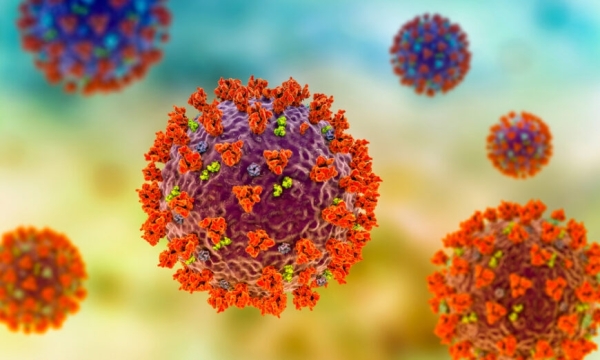Spike Protein Makes Women ‘Infertile’, Scientists Warn
In late January, 2021, just a month after the Pfizer and Moderna COVID-19 vaccines were granted Emergency Use Authorization (EUA) by the Food and Drug Administration (FDA) in December 2020, a dramatic change in Google trend searches for “decidual cast” was evident.
Another surge in interest occurred in mid-June 2021, a month after the Pfizer vaccine was granted an expanded EUA for adolescents ages 12–15 years.
A decidual cast is defined as: “a large, intact piece of tissue that is passed through the vagina in one solid piece. It happens when the thick mucus lining of the uterus, called the decidua, sheds in the near exact shape of a uterine cavity, creating a triangular cast.”
Women began reporting unusual menstrual conditions on social media, including decidual cast shedding (DCS). This prompted several internet-based surveys, one of which was conducted by MyCycleStory.com.
While the literature contains only case reports of DCS, making the true prevalence difficult to measure, the condition is thought to be quite rare. Fewer than 40 cases have been published over the course of 100 years, usually related to ectopic pregnancy, miscarriage, or prolonged progesterone use.
However, 292 women reported experiencing DCS during a 7.5 month MyCycleStory study period in 2021.
Even though the absolute number of cases is not that high, this unusually increased incidence over the background rate requires further study to ascertain the cause, and any other potential contributors related to the pandemic.
Studies Observe an Impact on Women’s Menstrual Cycle
In the United States Vaccine Adverse Event Reporting System (VAERS), over 11,000 people self-reported a menstrual-related issue to the system following COVID-19 vaccination by April 2022. Events included heavy bleeding, irregular or delayed menstruation, oligomenorrhea, and amenorrhea.
Likewise, the United Kingdom’s Medicines and Healthcare Products Regulatory Agency (MHRA) yellow card surveillance scheme received 51,695 reports of menstrual disorders, including heavier or delayed periods, and unexpected bleeding, after the COVID-19 vaccine.
Findings from these databases suggested the possibility of negative impacts in menstrual cycles following COVID-19 vaccination. The relationship between COVID-19 vaccination and menstrual cycle has been evaluated in several peer-reviewed studies.
In a large prospective cohort study conducted by Harvard, the Apple Women’s Health study, cycle length was manually tracked by 9,682 vaccinated and unvaccinated women who contributed 128,094 menstrual cycles, most of whom were vaccinated (88 percent) with Pfizer (55 percent) or Moderna (37 percent). Both cycle length and menses length were tracked prospectively to capture baseline, vaccination, and follow-up measures.
This study found that mean cycle length did increase following vaccination, particularly for women who received their vaccine during the first two weeks of the cycle, during the follicular phase.
Following the first dose in the follicular phase, the cycle length increased by 0.97 days, and following the second dose by 1.43 days. The cycle remained longer for one to two months after vaccination then returned to baseline.
Women who were vaccinated during the luteal phase tended to have a shorter cycle (-0.97 days).
Another prospective United States cohort study of nearly 4,000 women ages 18 to 45 years evaluated those with normal cycle lengths for three consecutive cycles before the first vaccine dose and three post-vaccine cycles (cycles 4, 5, and 6). Those who were unvaccinated were evaluated over six cycles during a similar time period.
The investigators computed within-individual changes in cycle length and menses length for cycles 1–3 and 4–6 then used mixed-effects models to compare differences in cycle and menses length between the vaccinated and unvaccinated cohorts.
The investigators found a mean 0.91 day increase in mean cycle length for women receiving the mRNA vaccine during their second vaccine cycle.
More vaccine recipients had a cycle length change of at least 8 days than unvaccinated (6.5 percent vs 4.6 percent, p=0.017). The longer vaccine cycles seemed to be concentrated among the 358 individuals who received both doses within a single cycle.
In this subgroup of vaccinated women, the unadjusted mean cycle length increase was 2.38 days and a substantially larger proportion (10.6 percent) had an increased cycle length of at least 8 days compared with the unvaccinated cohort (4.3 percent, P<.001).
The authors found no difference in menses length between cohorts.
A smaller Israel study among 219 women regularly tracking cycles also found changes in menstruation reported by almost 40 percent of vaccinated women. Parity (number of pregnancies) and medication use seemed to be risk factors for menstrual irregularities.
Half of those suffering from irregular bleeding were multiparous versus 31.5 percent multiparity among women with no irregular bleeding. Presence of comorbidities was also higher among women reporting irregular bleeding.
Interestingly, women reporting regular medication use were less likely to report irregular bleeding.
Another study included both a prospective cohort of 79 women and a retrospective cohort of 1273 women.
The study did also find a cycle length increase (delay to the next period) in women cycling spontaneously, suggesting that COVID-19 vaccination can lengthen the menstrual cycle.
However, no such change was observed among those using contraception, suggesting that this effect of COVID-19 vaccination may be mediated by ovarian hormones.
Read more



